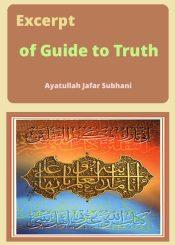Shi'ism in Relation to Various Islamic Sects
Shi'ism in Relation to Various Islamic Sects
0 Vote
280 View
By Dr. Abulqasim Gorji Usul al-Din (The Principles of Faith) The faith of Islam is based upon three principles: (1) belief in the One God, the Creator of the world-which is called al-tawhid (monotheism); (2) belief in the prophethood of Muhammad ibn `Abd Allah (S) as the last of all prophets (al-nubuwwah), and (3) belief in the Day of Resurrection (al-ma`ad). Anybody who wants to be considered a Muslim, must recognize these three principles (al-usul) through the agency of his intellect. Thus, there is no difference of opinion as to these main points among Muslims. However, the differences occur in some of the secondary issues related to the three principles, some of which are as follows: 1. About God's Affirmative Attributes (al-sifat al-thubutiyyah), namely, the qualities positively attributed to God, such as Omniscience, Omnipotence, Life, etc., the Ash'arites believe that as in the case of a human being whose attributes are different from his essence and dependent upon it, so with God, whose Essence and Attributes are different things; the latter being derived from His Essence. However, in the case of man the attributes are contingent (hadith) while God's Attributes are pre-eternal (qadim). In this connection, the Mu'tazilites have various beliefs, but most of them hold the same opinion as the Shi'ah. The Shi'ah say: If there is any distinction between Divine Attributes such as Knowledge, Power, etc., and the Divine Essence, this difference lies only at the level of conception and thought, and not in reality. "God" is the same as "Omniscience", the same as "Omnipotence", and, moreover, such Attributes are in reality one and the same. Therefore, nothing has been appended to Divine Essence from outside; rather God is Omniscient, Omnipotent and Living by virtue of His Essence. 2. About the Divine Will (iradah), the Ash'arites hold that Divine Will and Omniscience (`Ilm) are two separate Attributes. But the Shiites, and a group of Mu'tazilites maintain that God's Will is the same as His Knowledge, and they call it Da`i, meaning "Divine Intention". 3. No doubt, one of the Divine Attributes is Speech (Kalam); that is, God speaks, or is Mutakallim. However, since Kalam, the Divine Word from which the word "Mutakallim" is derived is composed of letters, and letters occur in a temporal sequence, so a disagreement of opinion has been caused in this regard. The Hanbalis consider God's Word (Kalam) to be pre-eternal (qadim), and some of them even believe the cover and sheath of the Holy Quran to be pre-eternal. The Karramiyyah hold God's Word (Kalam) to be hadith (temporal or accidental), yet consider it permissible for a temporal thing to be dependent on Divine Essence. The Ash'arites believe the Kalam to be hadith but have said: What is dependent on God's Essence is not the spoken Word (al-Kalam al lafzi) which is hadith rather, it is the sense and meaning of the Divine Word which is qadim. This they call "al-Kalam al-nafsi". Both the Shiites and Mu'tazilites have rejected the idea of al Kalam al-nafsi, and have said that the origin of the word "mutakallim" is "takallum" and not "kalam". And "takallum" (speaking) means origination or creation of literal speech (al-Kalam al-lafzi) in others. Now, "creation" or "origination" is a quality of Act, not an Attribute of Essence. So no problem arises out of its being contingent (huduth); for, though an Act issues from God, it is not dependent on His Essence. 4. The Ash'arites believe God to be visible, not in the way the Karramiyyah and the Mushabbihah believe, but in freedom from the factors of time and space. But the Shiites and the Mu'tazilites consider the possibility of seeing God incompatible with His immaterial, necessary existence and have explained away the Quranic verses and narrations of the Holy Prophet which in appearance seem to imply visual perception of God (ru'yah). 5. There are some differences of opinion as to whether actions can be regarded as "good" or "bad" in independence of the decree of the Divine Lawgiver (al-Shai'). The Ash'arites believe that a "good" action is that which the Shari`ah has ordered the people to do, and a "bad" action is that which it has prohibited people from doing. But the Shiites and the Mu'tazilites hold that "goodness" or "badness" of actions can be recognized by human reason; that is, regardless of the decree of the Shari`ah, some actions are good and some bad. The Lawgiver orders people to do what is "good" and prohibits them from doing "bad" deeds. 6. Is man really free to perform actions which are apparently done of his own free will, or is he compelled to perform such actions. A group of the Ash'arites are of the opinion that man's will and power have no effect in bringing about these actions, and it is only God's Will and Power that is effectual in their taking place. This belief is called "Jabr". The Mu'tazilites hold that the only factor causing these actions to take place is man's will and power. God has only created man and given him power, will and intelligence. As long as God has not taken these forces and potentialities away from him, he can independently do whatever he wants; there is no need for him to be instantaneously and constantly given power, will and other potentialities by God. This belief is called "al-tafwid". However, the Shiites believe that man's actions depend on his own will, but not in the sense that he is totally independent in doing them. Rather, just as God is the initiating cause (al-`illah al-muhdithah) of man's life, power and will that is, God has originally given man these qualities and abilities so God is as well the maintaining cause (al-`illah al-mubqiyah) of these potentialities and qualities. That is to say, God grants these powers and abilities constantly and perpetually, otherwise man cannot perform any action. Thus, such actions can be attributed both to God and man. This belief is neither determinism nor free will, but something between the two (amr bayn al-'amrayn). 7. About Divine Destiny and Providence (qada' wa qadar), there are also differences of opinion among Islamic thinkers. If by "Destiny" (qada) it is meant that all things even man's actions are brought into existence by God, and if by "Providence" (qadar) it is meant that the qualities and particulars of all things even of those things originated by man's will have taken place and shape solely as a result of God's Will, then qada' and qadar, in this sense, are accepted by the Ash'arites and rejected by the Shiites and the Mu'tazilites. And if by "qada" and "qadar" other senses are meant, such as: `The existence or happening of everything, even man's free actions and their particulars, depends on God's Will, but not directly, and rather through the special means of that thing, including man's will and power,' or if "qada "' and "qadar" are taken to mean `declaration and determination of some matter by God', then in both of these senses, qada' and qadar are admitted by the Imamiyyah Shiites. Moreover, there are certain verses in the Quran and ahadith of the Holy Prophet and Imams affirming this belief. 8. The Shiites and the Mu'tazilites consider it reprobate and wrong to attribute certain qualities or actions to God such as oppression, tyranny, giving of a duty to anybody beyond his strength, and so on, and believe it necessary and right to attribute certain qualities and actions to Him such as mercy, compassion, assigning of prophets and so on. The Ash'arites, due to their negation of rational foundation of goodness and badness of actions (al-husn wa al-qubh al-`aqliyyan) and also owing to their maintaining that nobody can possibly assign duties and obligations to God, reject both of the above viewpoints. But it is obvious that both of their own viewpoints rest on shaky grounds. Because, as to the first position, it has been established that the goodness and badness of actions are rational, and as to their second position, it may be said that by denial of certain qualities and actions to be attributed to God, what is meant is that such things as tyranny and oppression are inappropriate for the sublime station of God, and if some acts like assignment of prophets are considered to be incumbent upon God, it is meant that refraining from such acts is not becoming to God, the Almighty, which is affirmed by reason. And this notion of denial or incumbency, in this sense, by no means entails any imposition on God by somebody else. 9. Like the Mu'tazilites, the Shiites believe that since God is Wise (hakim), He never does any useless or frivolous action, any action which is in vain and devoid of benefit and expedience, because God is absolute and total perfection; the benefits of His actions accrue to His creatures, not to Himself. But the Ash'arites believe that since God has absolute perfection, His actions are not out of motives and purposes. 10. About prophethood (al-nubuwwah), the Shiites and the Mu'tazilites hold that because God is Merciful and Gracious (Latif) towards His creatures, it is incumbent upon Him to assign prophets to guide humanity; but the Ash'arites, owing to their denial of the principle of Divine Grace (al-Lutf), do not regard it incumbent upon God to assign prophets. 11. There is, on the whole, no difference of opinion as to the credibility of the principle of infallibility (`ismah) of the prophets. Rather, the differences lie in the secondary points of the issue. The Mu'tazilites have considered it possible for prophets to commit venial sins; that is to say, they believe committing venial sins is not incompatible with their prophethood. The Ash'arites and the Hashawiyyah have only regarded kufr and falsehood to be unattributable to the prophets, not other sins. Some Ash'arite scholars have said that a prophet cannot commit major or minor sins after being assigned to prophethood, but as for other sins, he can avoid committing them intentionally, not inadvertently. But the Shiites believe that since the prophet has to be a reliable and perfectly trustworthy means of Divine guidance, he cannot commit any sins, neither major, nor minor, nor venial, neither intentionally nor inadvertently, neither before nor after being assigned to prophethood. Usul al-Madhhab (Doctrines Particular to Sects) 1. There is no question as to the necessity of appointment of the Imam, leader or ruler of an Islamic society. The point of difference, however, is that the Ash'arites say that the appointment of the Imam is an obligation of the people themselves, and base their argument on quoted traditional evidence (adillah naqliyyah). The Mu'tazilites and the Zaydiyyah, too, consider the appointment of the Imam the duty of the people, but base their argument on rational reasons (adillah `aqliyyah). The lmamiyyah Shiites, in accordance with the belief in Divine Grace (al-Lutf), believe the appointment of the Imam to be incumbent upon God. 2. About the infallibility (`ismah) of the Imams, the Imamiyyah and the Isma'iliyyah consider infallibility as a necessary attribute of an Imam; but other Islamic sects have rejected the idea of necessary infallibility for an Imam. According to the reasons Nasir al-Din Tusi has set forth in his Tajrid, not only an Imam should be free of sin, but he should be immune from committing errors and mistakes as well. 3. Should there be any explicit Divine decree (nass) about the appointment of Imams? The `Abbasids believe that Imamah (leadership) is proved either through nass (explicit text or decree) or through inheritance. The Zaydiyyah hold that Imamah is proved through nass or through the Imam's calling upon the people to himself. And many are of the opinion that in appointing an Imam it is necessary either to have an explicit decree (nass); or eminent persons who are responsible for deciding the affairs of the society should accept the Imam as such. But the Shiites say, since `ismah (absolute infallibility) is a concealed matter and none other than God knows about it, only God can appoint the Imam, and thus there is no way other than that of nass. Usul alFiqh ( Principles of Jurisprudence) 1. There is no considerable difference as to the principle which maintains that inference of religious decrees can be based on or supported by consensus of opinion (ijma'). But there are some differences as to what are the criteria of authority and authenticity (hujjiyyah) of ijma` (consensus of `ulama'). The Sunnis consider ijma ` as a credible and an authoritative source (hujjah) by itself as soon as a consensus is reached. But the Shiites say that &d' (consensus of `ulama') is absolutely valid only if confirmed by an infallible lmam (imam ma'sum). 2. Also, there are some differences as to the validity of reasoning by analogy (qiyas mustanbat al-`illah). All the Sunnis, with the exception of the Zahiris, believe this kind of analogical reasoning (qiyas) to be a legal authoritative source (hujjah). But the Imamiyyah Shiites, in addition to rejection on logical and rational basis of all the arguments of the Sunnis in favour of qiyas, consider it as unwarranted in the light of explicit traditions (riwdydt) of their infallible Imams. 3. As to the practice of istihsan (application of discretion in a legal decision; something that looks "good" and "advisable" to a jurist, but he can't argue convincingly in its favour), there are some differences among various Islamic sects. The Malikis, the Hanafis and the Hanbalis believe istihsan to be hujjah (an authoritative source for legal decisions). But the Shi’ah, the Shafi'is and the Zahiris do not regard it as hujjah. In this respect, the Shi'ah say: Some of the definitions given for "istihsan" supply no credible reasons for their support, whereas other acceptable arguments advanced under its title affirm the validity of something which is not "istihsan". 4. As to the "expediencies of the situation" (al-masalih almursalah), many Sunnis, including Malik and Ahmad, consider them to be hujjah. That is, they infer religious decrees in accordance with expediences. But the Shiites and the Shafi'is do not regard al-masalih al-mursalah as hujjah. On the whole, in cases where inference has been made from expediences, in absence of a specific nass(explicit religious text or decree), the issue can be deduced from "general decrees" (nusus `ammah), or based on definite rational reasons; in such cases, no doubt, the inference is valid; however, its validity depends not on the basis of "expedience", but because of its compatibility with the "general decree" or on account of its rational basis. Otherwise, one cannot base an argument solely on "expediences" and pronounce a decree on this basis. 5. (Taswib wa takhti'ah): The Mu'tazilites and many of the leaders of Ahl al-Sunnah believe that in cases other than those explicitly defined or ordered (ahka mansusah), the interpretation of the Divine decree is subject to the opinions of mujtahidin (authorities on religious law); or, if a real decree (hukm) does exist and the opinions of mujtahidin turn to be the contrary of that hukm, the real hukm undergoes change and the new one will be considered the real hukm. This viewpoint is called "taswib"(ratification). The Imamiyyah Shiites, as well as many other Muslims, believe that in all cases, whether an explicit decree (nass) exists or not, there is, in fact, a fixed unchangeable decree (hukm) which the mujtahid may or may not find out. This viewpoint is called "takhtiah" (fallibility of mujtahids). Fiqh (Islamic Jurisprudence) In this category, many details and secondary issues (al-furu`) such as al?`ibadat (worships), mu'amalat (transactions), `uqud wa iqa`at (contracts) and other matters have been propounded, and the views of various Islamic sects, especially the Imamiyyah Shi'ah, have been explained. Here, to avoid prolongation, we refrain from mentioning all the furu`, and confine ourselves to pointing out only few of them. 1. Daman (suretyship): The Sunnis believe that besides the main debtor, the surety (the person who has stood surety for the debtor) will be held responsible for the due; but contrary to the opinion of the Sunnis, the Shiite believe that after suretyship the creditor can no longer ask the main debtor for the due, but can simply demand its return from the person standing surety. 2. Mut`ah (usufruct or temporary marriage): This decree of temporary marriage is considered abrogated by the Sunnis. But the Shiite believe that according to ijma ` and as suggested by Quranic verses and reliable traditions (riwayat), the decree of mut`a stands valid, and its permissibility which existed in the time of the Holy Prophet of Islam (S) remains as it was, and no change has occurred in that decree. 3. The presence of witnesses: The Sunnis believe the presence of witnesses in nikah (marriage contract) to be requisite for its validity. The Shiites believe that it is not necessary to have the witnesses present at the time of nikah, and contrary to the belief of the Sunnis, the Shiites believe it is requisite for the validity of divorce that two "just" (`adil) individuals should be present at the time of divorcing. 4. Regarding inheritance (irth), too, some cases of difference are observed, of which just two points shall be mentioned here: (1) If after paying the shares of the heirs, anything is left over from the property of the deceased person, the Sunnis allocate the remainder merely to the male relatives of the deceased person and call it "ta`sib ". But the Shiite divide the remainder among all those who have inherited from the deceased person in accordance with their shares and call it "radd ". For example, if the heirs of a (deceased) person are his father and a daughter of his, half the estate will be the share of his daughter and one-sixth the share of his father. As for the two-sixths of the estate which is still left, the Sunnis believe it to be the share of the father of the deceased person and the Shiites believe that it (the remaining two sixths) should be divided into four parts, and of these remaining four shares, three shares will be given to the daughter and one share to the father of the deceased person. On the contrary, if there is a deficit and the estate of the deceased person is less than the shares of his or her heirs and it is not possible to give all the shares of the heirs, for instance, if the heirs of a woman are her husband, her parents and a daughter of hers, half (1/2) the estate will be the share of her daughter, two-sixths (2/6) will have to be given to her parents and a quarter (1/4) to her husband, and if we add up the shares, it will become thirteen-twelfths (13/12) shares. In this case, the Sunnis deduct the one-twelfth (1/12) lacking from the shares of all the heirs in accordance with their own shares. That is, instead of dividing the estate into 12 parts, the Sunnis divide it into 13 parts and give six shares to the daughter, four shares to the parents and three shares to the husband of the deceased person. Obviously, in this way, the shares of all the heirs will somewhat diminish. And this is called (awl). But in the opinion of the Shiites, the deficiency will have to be borne by some of the heirs, in this case by the daughter of the deceased person. Source: alhassanain.com






